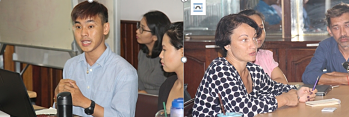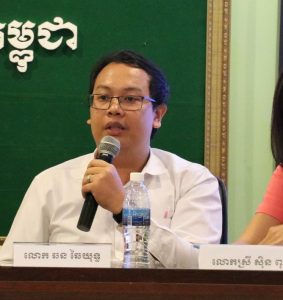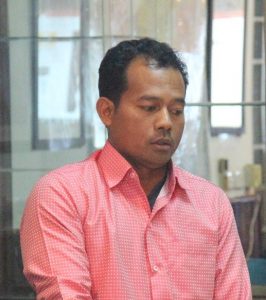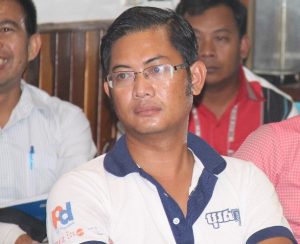In 2018, the SPIDER ICT4D Cambodia Network was decided to change its strategy from a permanent-based hosting by one organization to a round hosting (Rotation) from its primary partner organizations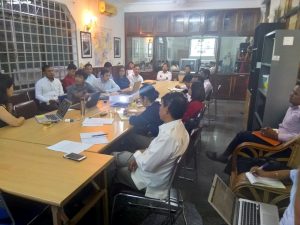 that founded the network. Currently, the Open Development Cambodia (ODC) is taking the lead to host the network. It has also shifted its focus from general-based to a deeper sectorial-based issues—education, health, and social advocacy; been trying to bring these two groups of ICT and non ICT NGO projects and practitioners within public and private sectors to share needs, experiences and future collaborations.
that founded the network. Currently, the Open Development Cambodia (ODC) is taking the lead to host the network. It has also shifted its focus from general-based to a deeper sectorial-based issues—education, health, and social advocacy; been trying to bring these two groups of ICT and non ICT NGO projects and practitioners within public and private sectors to share needs, experiences and future collaborations.
ICT for development in Cambodia is now
It is nowadays getting more popular that Cambodian people talking about ‘technology’ and ‘innovation’, especially young people who adapt better access to its modern technology. In other words, this group dominates the ageing demography, meaning that young people were born after the Khmer Rouge regime accounted approximately 70 percent of the total population and becoming the driven force to deliver change for social economic 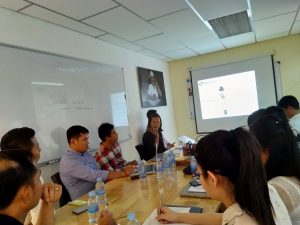 development in the future.
development in the future.
Looking back to 5 years ago, while “ICT4D” context was formally addressed in 2014 there were only the 2 keys ICT4D-implimented-partners as such as SPIDER ICT4D Cambodia Network and USAID’s DI began the conversation on ICT4D gradually and continually revisit and complement together its values of ICT4D consultation and representing as key focal point in ICT4D role in Cambodia.
ICT4D Cambodia Network projects has been considered one among key other actors, created in 2013 working as a collaborative of local and international NGOs include Open Development Cambodia (ODC) was the time a project under East West Management Institute (EWMI), InSTEDD iLab South Est Asia, Women’s Media Center of Cambodia (WMC), and Open Institute (OI) began support social development needs through leveraging information and communication technology in Cambodia.
USAID’s Development Innovations (DI), was then established in 2014 and officially known as a pool of millions of funding supported civil society, private sectors, and also engaged investors to begin testing out technology idea focus user-centered design to impact social development projects. Since then tech-startup ecosystems in Cambodia was significantly increased in Cambodia with the jump into a sector from the Smart Axiata, one of the leading mobile operators has formed partnership with government’s ministries, and as well as jointed venture to non-government organizations towards the development of a thriving digital ecosystem in Cambodia.
Last but not least, you should never forget Cooperation Committee for Cambodia (CCC), an umbrella organization for big and small around hundreds NGOs as such as funding partners, and international and local in Cambodia, has been also put in place the agenda on ICT4D into its regular member networking forum.
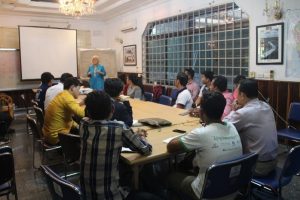
Today, funding and investment in the tech-startups ecosystem in Cambodia has been growing last several years by small amount of seed funding, awarded via a local and international competitions. 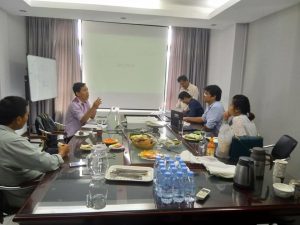 The Cambodia Information and Communication Technology Award (CICTA), the biggest local competition contest platform, was initiated by the Ministry of Posts and Telecommunications (MPTC) since 2015 aimed at awarding the most innovative of ICT technology achievements in Cambodia. There is also increasing tech-startup incubation program dominated by hubs and co-working space, which often partnering with business and NGOs to provide mentoring and funding to young entrepreneurs to start-ups social business contributing to its efforts for community solutions. Those are also include the ICT4D solution incubator program implemented by InSTEDD iLab SEA with the support from SPIDER, supporting CSOs/NGOs to incubate the most potential development issues through using ICTs for development.
The Cambodia Information and Communication Technology Award (CICTA), the biggest local competition contest platform, was initiated by the Ministry of Posts and Telecommunications (MPTC) since 2015 aimed at awarding the most innovative of ICT technology achievements in Cambodia. There is also increasing tech-startup incubation program dominated by hubs and co-working space, which often partnering with business and NGOs to provide mentoring and funding to young entrepreneurs to start-ups social business contributing to its efforts for community solutions. Those are also include the ICT4D solution incubator program implemented by InSTEDD iLab SEA with the support from SPIDER, supporting CSOs/NGOs to incubate the most potential development issues through using ICTs for development.
New collaboration offers new possibilities
In the past, few numbers of local tech companies were established with lack of capability to the demand of the market and limited human resources, for example developers. Kampuchean Action for Primary Education (KAPE), one of the member attended into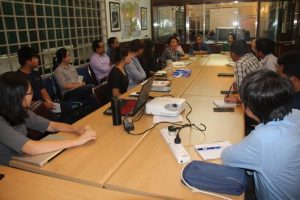 the ICT4D meeting, has been working to improve equality of education through promoting the use of ICTs in public primary schools. He realized into the ICT4D in education networking meeting on the 23rd of August, 2018 that there was very rarely and difficulty to look for local tech-company or individual developers that fulfill our (KAPE) requirements to build technology at that time (Last 5 or 10 years ago). Only the solution was made to deal with tech-led education projects was to outsource IT services from oversea. We faced several challenges and even struggled with the local language ‘Khmer fonts’ found very difficult to make it adaptability at that time. Sometime took longer time than expectation through working distantly.
the ICT4D meeting, has been working to improve equality of education through promoting the use of ICTs in public primary schools. He realized into the ICT4D in education networking meeting on the 23rd of August, 2018 that there was very rarely and difficulty to look for local tech-company or individual developers that fulfill our (KAPE) requirements to build technology at that time (Last 5 or 10 years ago). Only the solution was made to deal with tech-led education projects was to outsource IT services from oversea. We faced several challenges and even struggled with the local language ‘Khmer fonts’ found very difficult to make it adaptability at that time. Sometime took longer time than expectation through working distantly.
Mr. Chhorn Chhayyuth
“You would never see as many as hubs, startups, co-working space, and innovation projects in the country compared with last 5-10 years” said by Mr. Chhorn Chhayyuth, Education Technology Specialist, KAPE
As part of the ongoing support to the MoEYS’s reform, and in regard with the initiative of the New Generation Schools (NGS), KAPE has currently been working closely with InSTEDD under the financial support from SPIDER developed Sor Se Khmer App, a Khmer writing mobile app, to help children in grades 1 to 3 to learn how to read, write, and speak proper Khmer through entertaining and enjoying interactive learning methods. Another achievement in addressing lack of career counselling in high schools across Cambodia, which had already in planned of the ministry set to be implemented in 2018. In late 2017, Trey Visay, an e-counselling mobile application for high schools students from grade 9-12 providing support such as evaluating major and career, suggesting a school, vocational training, and life skill program and providing education career videos. It is planning to hand over to the ministry to take into account in the 2018.
“Imagine, if you look for technology, what will you do now compared with past? It’s not easy to get the rights one in the right time but it’s even harder to get nothing at that time,” said by Mr. Chhorn Chhayyuth, Education Technology Specialist, KAPE.
Many local tech-labs, hubs, and co-working space have currently set up in the country, and a room for ICT4D consultation. It is even better to benefit CSOs/NGOs if it is would like to learn and integrate technology-led development projects. You could better imagine how effectiveness and efficiency of the collaboration projects (comparing with the past) that required no much technical assistance and configuration from a distance and reducing time consume once it is error, cost-effective, and better to learn and develop based on its different contexts. But rather than wait for comers (clients), some available communication technologies have been customized based on Cambodian context (Khmer language) by local tech-hubs and labs to catch up with the needs of its Cambodian community and promoting its innovation within the pre-launch offering a free-Trial version for using its service. For example, localization technology of M&E system, digital data collections.
Changes in knowledge through creating ICT4D agenda discussions
In ICT4D for social advocacy network meeting brings together, not only just partners of USAID’s Cambodian Civil Society Strengthening (CCSS) project implemented by EWMI Cambodia, but open to other interested NGOs to meet and discussing on ICT4D every 3 months, how ICTs could make better impact of social advocacy projects. Engaging between non and ICT-NGOs projects bring about improving better knowledge of communication technology and strengthening access to ICTs. By having access to adequate information through ICTs meaning positive decision-making process and getting your voice to be heard.
“Bringing toward strengthening CSOs/NGOs in various development sectors, the role of ICT4D in this day promoting in a cost-effective way of communicating and exchange information for improving social and economic development projects of CSOs/NGOs Cambodia. That’s why the ICT4D should be held to discuss in the networking meeting,”said by Ms. Sin Kimsean, Deputy Chief of Party and Grants Manager at CCSS/EWMI.
Significant importance of ICT4D agenda into the CSOs/NGOs networking meeting, it is seen an improvement in term of knowledge and attitudes changes throughout the ICT4D in social advocacy networking meeting. Some NGOs have already benefited and utilized available communication technologies, for instance, Ponlok Khmer (PKH), who had shifted its focus from using traditional to adapt digital data collection through smartphone via Kobo Toolbox. Nowadays, PKH has also been utilizing another open-source, Prey Lang app, developed by the Alexander Soros Foundation and DANIDA to assist the Prey Lang Community Network in reporting about the forest logging and grabbing issues in the Prey Lang Protected area in Preah Vihear province. After presenting and sharing such used cases and its practical experience how were PKH’s challenges and motivations from utilizing traditional to digital, it was realized few more NGOs willing to change. Nak Aphiwat Sahakum (NAS), one of the NGOs who had attended the ICT4D meeting and also participated into the ODC’s Data collection through smartphone using Kobo Toolbox, is in the process of applying ICTs for make better impact of its project.
Mr. Som Orn
“At the time, adopting data collection through smartphone was about to reducing confrontation between my activity project (Advocacy NGOs) and the local authority once conducting data collection at the grassroots level. Secondly, it is about paperless consuming that contributes to climate change mitigation.” said Mr. Som Orn, Project Officer, PKH.
Mr. Han Senghuor
“I first thought its complication if you talk about ICTs into the development agenda. Finally, it’s very impressed me to speak out about my project’s challenges though having no ICT experience, given understanding other similar issues that benefits from the use of ICTs to make better impacts through open-source technology”. Mr. Han Senghuor, Deputy Director of NAS.
Besides, ICT4D have also been conducting and discussing within education and health groups following the similar platform of ICT4D in social advocacy networking meeting. Thus, it creates of values of working collaboratively as network either formal or informal, allowing them who have a wills to learn, sharing, and promoting discussion within each sector-based issues and how technology could solve these social needs (ICT4D).
However, the strengthening of collaboration through address ICT4D agenda in various sectorial networking has always had good idea, but the recent emergence of startups, and labs and how CSOs/NGOs really benefits from its collaboration to the development of ICT4D projects is still a big question to be asked, in particularly how sustainability of it. The SPIDER ICT4D Cambodia Network shall continue to engage public sector–government’s ministry, and private sector—CSOs/NGOs, and private company, and particularly academia should be maintained to talk on about challenges, strengths, and opportunity of ICT existed projects and what should be the opportunity to move on next. Sustainability of any technology and development projects could not be happened without the contribution from the government.

